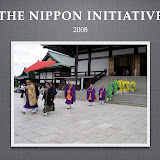 10-13-06
10-13-0610:47 a.m. Tsubame Relay 4
We changed trains again a few minutes ago, so now we have also changed bloggers. Dale is taking a break, and it is back to me.
The train we are on now is definitely the nicest of all we have ridden so far. The seats are large, and they even serve a beverage along the way. On other trains, customers can purchase a coke, bottled water, or juice from a beverage cart. The carts also feature a variety of light snack items. The prices are comparable to what you might see at any of the stations or local convenience stores. This leg lasts for about an hour and a half.
Yesterday late afternoon, Tom Carr and I talked at length about the difficulty of reaching Japanese people for the Lord. Tom remarked that unlike the circumstances of so many other places in the world where missionaries serve the advanced standard of living here means that people perceive that they have very few, if any, needs. They certainly don’t perceive their need for Christ. Consequently, it is a definite challenge to the way in which we usually present the Gospel.
In the States, the Gospel is presented most often in terms of what Christ “can do for you.” If you need forgiveness, Christ will give you forgiveness. If you need meaning in life, Christ will provide you with meaning. If you need help with your marriage or with other relationships, Jesus will help with that too. Whatever your need may be, trusting in Christ can help. Years ago, someone popularized this kind of thinking with the slogan, “Christ is the Answer!” It wasn’t unusual to see the slogan on posters, bumper stickers, and billboards. It was the previous generation’s version of the WWJD or Live Strong bracelets.
This approach to presenting the Gospel is not wrong. But what do you do when someone, or an entire group of people, does not sense any need for Christ at all? The notion of “Christ died for you” hardly connects or makes sense.
Our church family has often heard me speak of C.S. Lewis’ explanation of the various types of love, an understanding of which very much applies in the context of reaching Japanese for Christ. Lewis suggests three types of love: (1) need love; (2) gift love; and (3) appreciative love. Need love is the love that you might have for someone or something because they meet a need in your life. Gift love is the kind of sentiment you have for someone or something that motivates you to give of yourself to the person or thing that is loved. Finally, Appreciative love is love that is directed to someone or something because of something about them (or it) that really has nothing to do at all with the person who is doing the loving. A good illustration of appreciative love is the response we might have to a beautiful sunset. The beauty of a sunset really has nothing to do with the person who is looking on in admiration. It would still be beautiful even if that person were not there to admire it. Nevertheless, it would be a shame if the beauty of a sunset went unnoticed or if a person stood there looking on and failed to appreciate the beauty that he or she were seeing.
C.S. Lewis observed that gift love is a lot like God’s love for us; thus, John 3:16 says: “God so love the world that he gave his one and only Son….” And need love is a lot like our love for God. We love him, because of all he does and has done for us. Unfortunately, the greatest problem with need love is that it tends to diminish or go away altogether once the need that is driving it has been met. Of course, it also tends not to exist at all if there is no need to get it started in the first place.
That brings us back to Japan and presenting the Gospel to people who sense that they have very few, if any, needs—especially any spiritual needs, and even more especially any need for Christ. So what do we do? In my opinion, we should present the Gospel in terms of appreciative love. In other words, we should present the Gospel, not just in terms of what Jesus “can do for you”; but rather, in terms of all that is true of Jesus as the exalted Lord of Lords and how he deserves for people to place faith in him. He deserves for people to bend their knees and confess with their mouth that he is Lord. He not only deserves it, he commands it.
We can communicate that it is an even greater shame for Jesus’ beauty and position to go unnoticed than it is for a beautiful sunset to go unnoticed. Just as all people everywhere have been made to admire the beauty of sunsets, so they also have been made to respond in faith to the remarkable majesty of the Lord of All. I can’t help but coming back to the thought that perhaps Japanese people might understand this better than most because of their experience with emperor worship. The only difference is that Jesus is not just another emperor in a long line of emperors going back a few thousand years. And he is not just the emperor of Japanese only. He is the Emperor of Emperors, from now and forevermore. And not just of Americans, not just of Japanese, but of every person. I love what Acts 10:34-36, 42b-43 says: “I now realize how true it is that God does not show favoritism but accepts men from every nation who fear him and do what is right. You know the message God sent to the people of Israel, telling the good news of peace through Jesus Christ, who is Lord of all…he is the one whom God appointed as judge of the living and the dead. All the prophets testify about him that everyone who believes in him receives forgiveness of sins through his name.”

1 comment:
Thank you for this very helpful article about witnessing to Japanese people. I agree with your observations and appreciate the approach of "appreciative love." My Japanese language skills are so lacking when it comes to trying to express these truths to friends and family members. It would be great to have a tract or booklet available in Japanese that presents the Gospel in this way. Again, thank you for sharing this.
Post a Comment